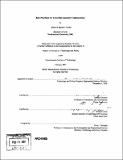Best practices for university-industry collaboration
Author(s)
Calder, Edward Spencer
DownloadFull printable version (2.846Mb)
Other Contributors
Massachusetts Institute of Technology. Technology and Policy Program.
Advisor
Edward Greitzer and William Lucas.
Terms of use
Metadata
Show full item recordAbstract
This thesis reports findings from a study of best practices for university-industry collaboration. The study involved over 70 interviews at 17 large technology companies with company managers and individuals having responsibility for the portfolio of industry sponsored projects at universities. A primary finding concerns the role of boundary agents in a company, i.e. individuals that facilitate knowledge transfer across organizational boundaries. Boundary agents are shown to have a strong positive influence on the value of a project and practices are thus described that foster boundary agent activity. For the cases studied, it is also found that longer term collaborations produce results that have more impact on the company and that geographic separation between university researchers and the company has little affect on project outcomes. Three different types of alignment have been found to affect project results and practices relevant to achieving each type are presented. External alignment, the mutual understanding between university researchers and the company of a project's goals and methods, is achieved primarily through regular meetings and selection of a university researcher with an appropriate background. (cont.) Internal exploitative alignment, in which the impact of the university project is enhanced by complementing research and development within the company, is accomplished through activities, such as technical review panels, that explicitly link a project with these internal R&D activities. Internal exploratory alignment, the degree to which a project can produce valuable results not in the original research plan, is achieved by actions such as testing the project outcomes on company equipment; these can take place after the main phase of the project is completed.
Description
Thesis (S.M.)--Massachusetts Institute of Technology, Engineering Systems Division, Technology and Policy Program, 2007. Includes bibliographical references (p. 41-45).
Date issued
2007Department
Massachusetts Institute of Technology. Engineering Systems Division; Technology and Policy ProgramPublisher
Massachusetts Institute of Technology
Keywords
Technology and Policy Program.